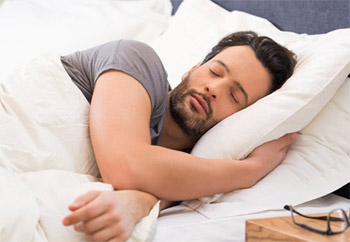Alternative Sleep Apnea Treatment Options
April 2018
 Why is sleep apnea dangerous to your health?
Why is sleep apnea dangerous to your health?
Sleep Apnea is a dangerous condition that can affect your health and you may not even know that you have it. Sleep apnea occurs when your upper airway becomes blocked during sleep, which causes a reduction or complete stoppage of airflow. If untreated, sleep apnea can cause many conditions such as excessive daytime fatigue, high blood pressure, cardiovascular issues, type 2 diabetes, and metabolic syndrome just to name a few. Luckily, sleep apnea can be treated in multitude of ways that are easily accessible.
What are some alternative sleep apnea treatments?
The first is simple life adjustments.
- When treating sleep apnea, the first thing you would want to adjust would be the things you have control over such as your physical health and diet.
- Excessive weight or obesity can cause fat tissue to build up around the throat and at the base of the tongue which can cause the tongue to slide down and block the airway passage. Exercise and a healthy diet can help reduce the fat tissue in the body, strengthen your cardiovascular system and help with also preventing Type 2 diabetes.
- In addition to diet and exercise, the next thing you can change is your sleep hygiene (environment). Changing your sleep hygiene consists of avoiding stimulants such as caffeine and nicotine before bedtime, increasing your exposure to natural light during the day, establishing a regular bedtime routine such as having a set bath and bedtime, assuring that the room temperature is between 60 and 67 degrees, and avoid watching television and cell phone use prior to sleep. Watching television or using your cell phone late at night can make it difficult to sleep because it sends off “blue light” which signals your brain to stay wide awake.

What if the above conservative treatments fail?
If none of those methods work, another alternative to treat sleep apnea would be medical and pharmaceutical treatments.
- With pharmaceutical treatments, your physician would prescribe medications to help with complications of sleep apnea.
- Nutraceuticals can be taken to prevent further worsening of certain conditions, and possibly guide in muscle relaxation to allow for better airway.
- There are several anatomical adjustment methods such as surgery and medical appliances.
- The most common used medical device to treat sleep apnea is a CPAP (Continuous Positive Airway Pressure) machine. A CPAP machine utilizes the pressurized air that is delivered through a special delivery system which utilizes a mask or nasal pillows. The CPAP machine is considered the “gold standard” when it comes to sleep apnea treatment, but many people find the CPAP machine very frustrating to use due to discomfort of the mask and the limited sleeping positions.
- Another commonly used medical device to treat sleep apnea is an oral medical appliance. An example of an oral medical appliance would be an Oral Mandibular Device. What it is, is when a sleep appliance dental specialist custom makes a mouth guard that hinges the jaw forward so that it prevents the jaw and tongue from sliding to the back of the throat to allow an open airway passage while you sleep in any position. An oral Mandibular device helps prevent snoring and breathing gasps in the middle of the night so that you can get quality sleep and have proper amounts of oxygen saturation throughout the night which leads to more energy, less fatigue, and no morning headaches.
- The last resort to treat sleep apnea would be surgical treatment which most people dislike due to the pain, overnight hospital stays and the bleeding. A few procedures commonly used to treat sleep apnea would be the removal of tonsils, adenoids and uvulo-palato-pharyngoplasty.
- Another option, which is gaining popularity is to have a stimulator placed immediately underneath the skin of your chest area which sends a signal to your airway muscles and help keep them open throughout the night, without any devices or machines to be worn. Although this is surgically placed in your body, it stays within your body just as a pacemaker does. And it only turns on, on command, when you go to sleep to hold your airway open.
The best method to decide which of the above treatments are best for you, you must see a physician who has expertise and experience in the field of sleep medicine.
Family practice physicians who are members of American Academy of Sleep Medicine can easily do an in-home sleep test and be able to medically evaluate you and give you the best treatment options.


